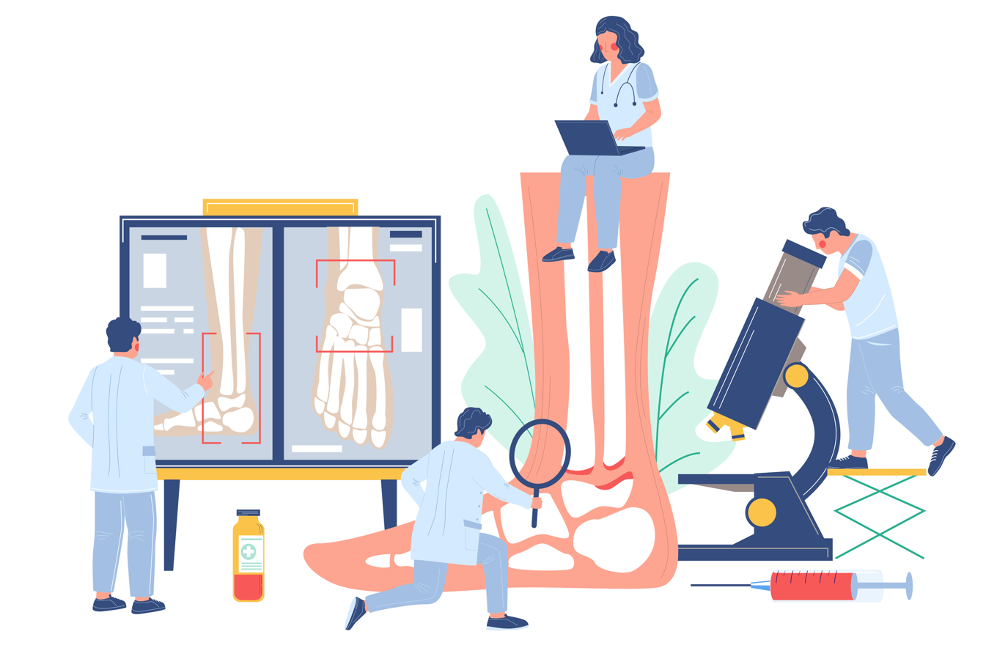When it comes to managing rheumatic conditions, an accurate diagnosis is essential and lays the groundwork for developing a personalized treatment plan. With a thorough understanding of your condition, a specialist may guide you toward the most suitable interventions, medications, lifestyle modifications and therapies to help alleviate your symptoms and enhance your overall well-being.
Below, these rheumatologists in Northwest Indiana explore the many different diagnostic techniques rheumatologists use to help them understand the intricacies of your rheumatic condition.
Common Diagnostic Procedures
- Initial Assessment: During your first visit, your rheumatologist in Northwest Indiana will conduct a comprehensive evaluation, review your medical history, listen to your symptoms and perform a thorough physical examination. This initial assessment forms the foundation for determining the appropriate diagnostic procedures.
- Blood Tests: Blood tests play a crucial role in the diagnostic process. These tests search for markers of inflammation, autoantibodies and other indicators that may help confirm or rule out certain rheumatologic conditions. Your rheumatologist may order specific blood tests, such as a complete blood count (CBC), erythrocyte sedimentation rate (ESR or “sed rate”) and rheumatoid factor (RF) to reveal the underlying causes of your symptoms.
- Imaging Studies: Imaging studies, such as X-rays, ultrasound, and magnetic resonance imaging (MRI), provide a closer look at affected joints. X-rays may reveal signs of joint damage, such as bone erosion or narrowing of joint spaces. Ultrasounds use sound waves to create real-time images of soft tissues, allowing for a detailed examination of joints, tendons and surrounding structures. MRIs provide a more comprehensive view and may detect early signs of inflammation or damage that may not be visible on X-rays or ultrasounds.
- Joint Aspiration: In some cases, your rheumatologist may recommend a joint aspiration, also known as arthrocentesis. This procedure involves extracting a small amount of joint fluid for analysis. By examining the fluid under a microscope and conducting lab tests, your rheumatologist in Northwest Indiana can identify the presence of infection, crystals (such as urate crystals in gout) or other abnormalities contributing to your symptoms.
Other Specialized Tests
In addition to the standard diagnostic procedures discussed earlier, your rheumatologist may recommend specialized tests based on your specific symptoms and suspected condition.
- DEXA: One of the specialized tests your rheumatologist may order is a bone density scan, also known as a dual-energy X-ray absorptiometry (DEXA) scan. This non-invasive procedure is used to identify areas of bone loss and assess your risk of fractures, particularly in cases of osteoporosis.
- EMG: If your symptoms involve muscle weakness, numbness or tingling, your rheumatologist in Northwest Indiana may recommend an electromyography (EMG) test. This specialized test evaluates the electrical activity of your muscles and the function of your nerves and can help diagnose conditions such as myopathy, neuropathy and other disorders affecting the muscles and nerves.
- Skin Biopsy: In some cases, a skin biopsy may be necessary to provide valuable insights into your rheumatologic condition. Skin biopsies involve the removal of a small sample of skin tissue for examination under a microscope. This procedure allows your rheumatologist to identify markers of conditions such as lupus or vasculitis, helping confirm the diagnosis and guide appropriate treatment decisions.
Looking for an Affordable Rheumatologist in Northwest Indiana?
Are you ready to meet with a rheumatologist in Northwest Indiana who can diagnose your condition and develop an effective treatment plan? If so, 219 Health Network is here to help. Our licensed rheumatologists understand the complexities of rheumatologic conditions and are committed to delivering personalized care that addresses your unique needs. By partnering with us, you gain access to specialized knowledge, advanced diagnostic techniques, and a supportive healthcare team that will guide you every step of the way.
Contact us today at 833-219-0001 to learn how we can help.

